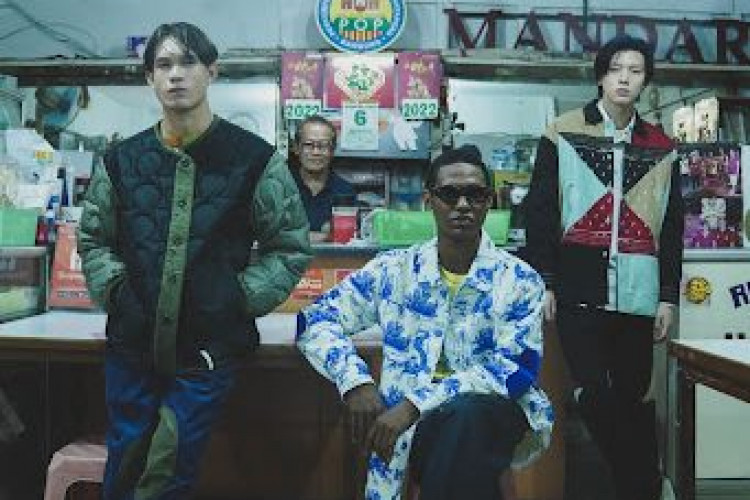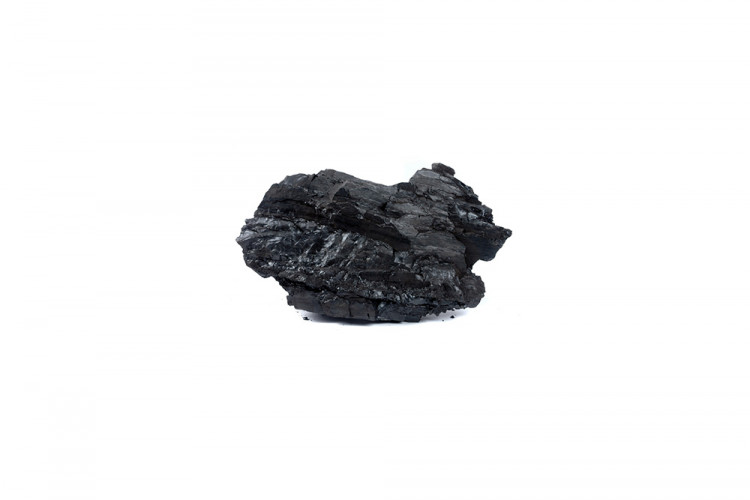Being Earnest with Glen Goei
Mariati Galatio (M) talks to director Glen Goei (G) during Tropfest SEA.
by Ken Jenie

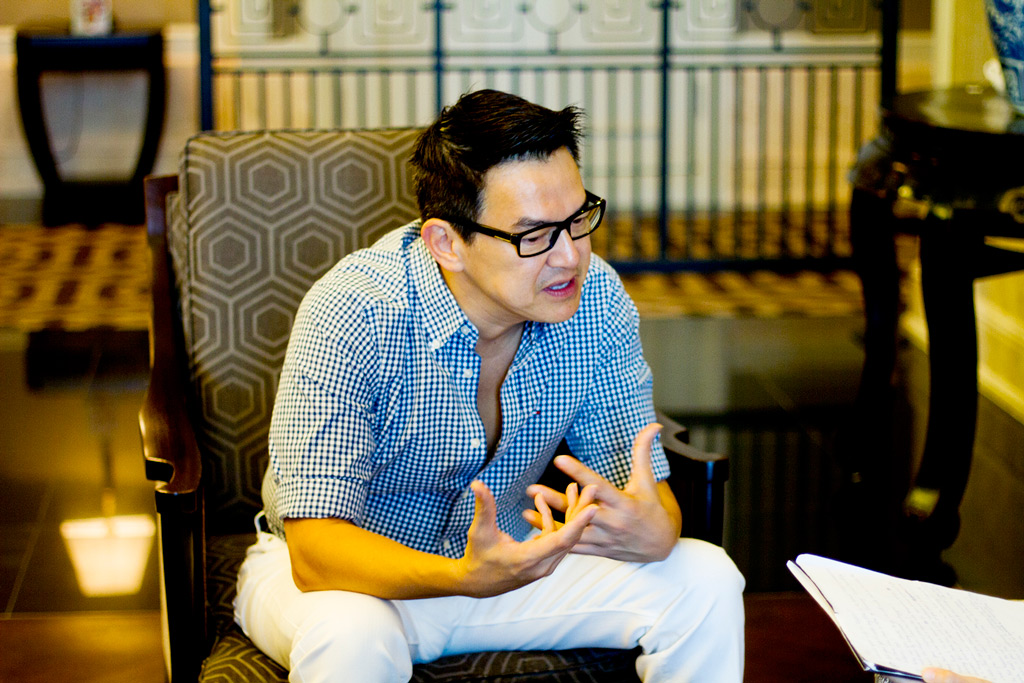
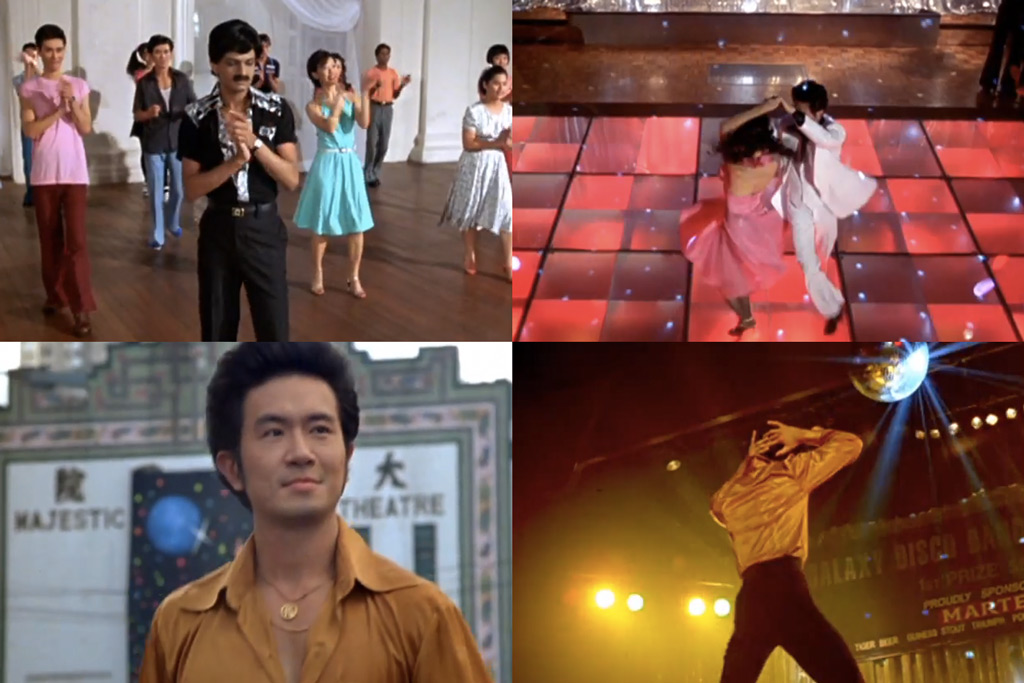
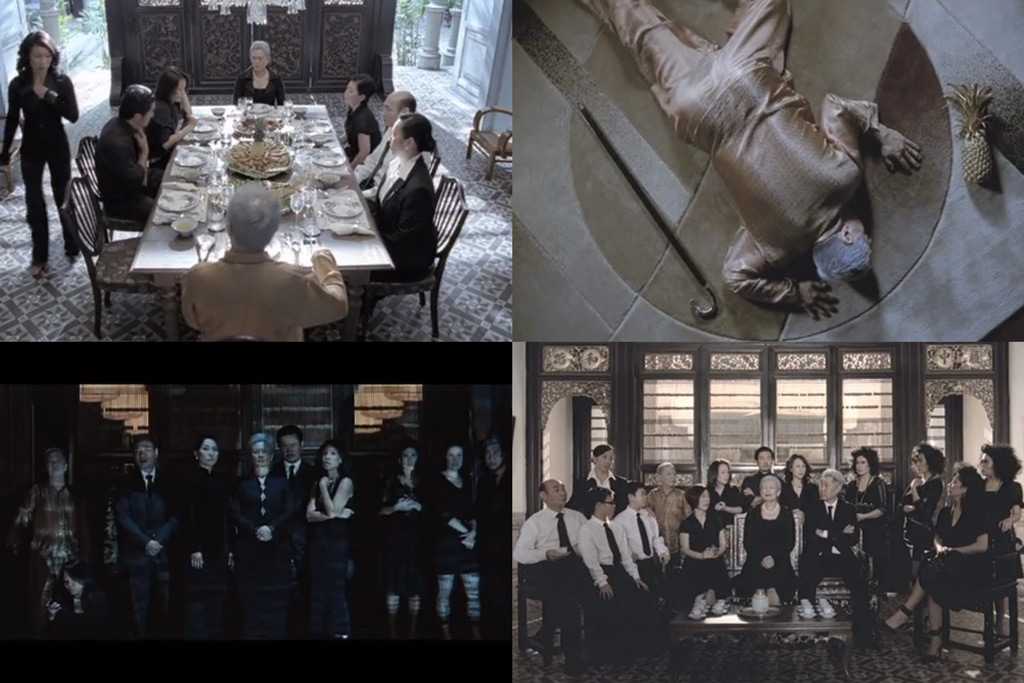
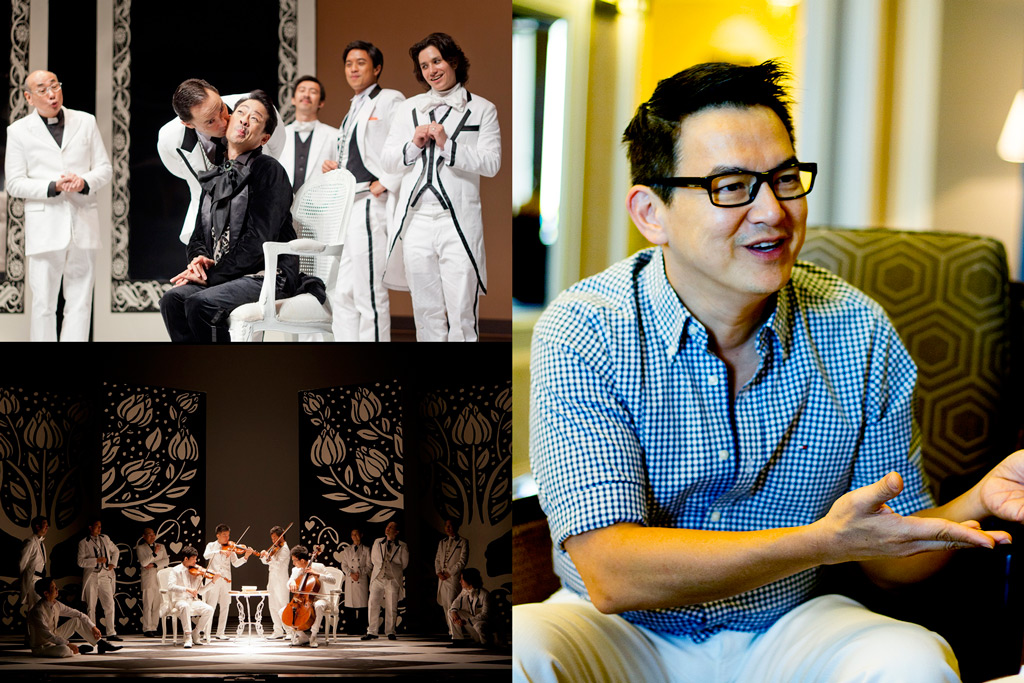
M
What is your role in Tropfest?
G
I am one of the judges in the festival.
M
You directed a play, Oscar Wilde’s “Importance of Being Earnest”. Why did you decide to use an all male cast?
G
The context of Singapore is that we inherited a legal constitution called 377A. That law criminalizes homosexuals, and in, I think 2007-2008, there was an unsuccessful campaign to repeal the law. I suppose that was the context of how I came up with the idea of using an all male cast for “The Importance of Being Earnest”. 377A began around the same time Oscar Wilde went to prison, in fact a month after he wrote “Importance of Being Earnest”, he went to prison.
M
This 377A is quite an old law.
G
Yes, it started in the Victorian period. Before this period such laws didn’t exist – the law really began in the late 19th century, and was first imposed on Oscar Wilde. When I thought about doing “Importance of Being Earnest”, I started doing a lot of research on Oscar Wilde’s life, and what I found were parallels to what was happening in Singapore at the time. As I was reading the play I felt that every voice, every character was Oscar Wilde – so I decided that it should be an all-male cast because they were all Oscar Wilde.
It worked very well because, if you see traditional interpretation of “Importance of Being Earnest”, the women look very frivolous and silly. For a strange reason, when men play the women’s parts, you suddenly no longer look at the gender – they’re genderless, it is irrelevant that they are playing female characters.
M
Did the actors have to get into the female characters when they performed their roles?
G
It is free for them to interpret, but it is obvious that male actors are playing female characters as men. It was a very interesting take on the play, we are bringing it to Macau in May.
M
The reception was very good, I gather.
G
Yes. We revived it once already and had a total run of 8 weeks.
M
Are your plays usually a response to what is happening around you?
G
In W!ld Rice, my theater company, we are artists that feel responsible in representing the people because in Singapore, the government regulate the media – television, radio, internet even. We feel that there is little room for the people’s voice to be heard, so it is the responsibility of the artist to represent that voice. We provide a platform through our art – we are the conscience of the people. We feel the need to represent these voices through our plays and films.
M
You criticize through your art.
G
I don’t like using the word criticizing. I use the word challenge, to pose questions – whether it is towards the state or the people. We like to pose questions. I think art is not about criticizing, art is about challenging, art is about inspiring, art is about putting things in a different perspective – making people look at the world from a different point of view. It’s about provoking thought rather than simply criticizing.
M
What is the theater scene like in Singapore?
G
It is very healthy. Singapore has a lot of theater companies; there is a production every week of the year by different troupes. There are different languages, Malay, Chinese, English. Even if I do not understand the language, I will go see a Chinese or Malay play because it still talks about the society that I live in.
M
Aside from language, what differences and similarities do you see when watching plays with different language?
G
I think the framing is very similar but, obviously, the themes they talk about pertains more to their culture’s problems. It is interesting to me because I am watching my own society from a different point of view – I couldn’t witness it any other way.
M
Is this theater scene relatively new?
G
The professional theater scene started around 1986-87, so it is very young. Of course the theater scene was already around since the late 60s. When the first generation of Singaporean studying abroad returned – lawyers, architects, doctors, etc – and they started writing in both English and Chinese. So our first wave of playwrights was in the late 60s, early 70s –especially in the 70s. Professional theater in Singapore really started in the late 80s, so now it is about 25 years old.
M
You directed That’s the Way I Like It, and Blue Mansion. These two films are fast-paced, filled with witty dialogue, and sometimes over the top emotions. Why would you say you are drawn to making films with these types of characters?
G
I think it is my worldview, it is the way I see the world. I don’t see the world simply as a tragedy or comedy – they are both sides of the same coins. I believe in the Yin and the Yang, and that is how I make my films – I see the fun side of tragedy, and I see the tragic side of comedy. When I look at the world, my culture – as an observer I sometimes see that life is stranger than fiction. Blue Mansion, for example, was inspired by going to a lot of wakes. Asian wakes can be very dramatic, and if you watch the film, it is all there. For Chinese people – we were Taoist, and somewhere along the way we became Buddhist, and after education (as we were a British colony) we became Christian. Everything becomes complicated because of it. Let’s say a family member dies, there will be huge quarrels about what sort of funeral rites to take. It is always about religion, and I believe that it comes down to ego – everybody thinks they were raised the right way. I put that in my film because that is what I see in life.
M
The content of your films are personal, then?
G
Absolutely, the sensibilities in my films are definitely mine.
M
To be honest, I have only seen the trailer for Blue Mansion, and it reminds me of Robert Altman’s Gosford Park, where it is a murder mystery as well.
G
Yes! It was inspired by Robert Altman’s film, but my film is much more of a dark comedy rather than his murder mystery. I made Blue Mansion to criticize the tradition of patriarchy, which is very entrenched in Asia – the gender specific roles we play in society are so defined. Maybe nowadays women can go to university etc, but even so, the perception is still very apparent. Blue Mansion is my criticism towards the patriarchal system.
M
You are Singaporean but have lived in England for a long period of time. Would you say that your stay there influenced how you make films?
G
I suppose it did, but even before I went to London I grew up watching the BBC and British Comedy – I’m completely Monty Python (laughs). I grew up on British humor so I was already influenced even before I left.
M
What would you say is a Singaporean style filmmaking?
G
I wouldn’t say there is a Singaporean filmmaking style yet. It’s too young, and the body of work isn’t large enough for any distinct style to emerge from it. My own films and sensibilities is quite anglophile – ironic, tongue in cheek – and when you see a film like Ilo Ilo, you can tell that Anthony [Chen] is very much influenced by Taiwanese films – Ang Lee, Edward Young, Tsai Ming Liang.
I grew up on a diet of British and American films, and I am still looking for my voice in filmmaking. I am more defined in theater – I feel that I have a certain style established.
M
Would you say that you prefer theatre rather than film?
G
I would love to make more films, but making films is so expensive. Also, to create a script is very difficult – I am not a writer, even though I wrote That’s The Way I Like It. In theater there is such a huge body of work I can draw from; Shakespeare, Moliere, Pinter, Oscar Wilde, Marivaux; I can direct three plays a year. Meanwhile, I have to write for films, and there aren’t too many writers in Singapore.
M
What are the similarities and differences between making plays and films?
G
There are quite a few similarities, especially when working with actors – I approach both mediums the same way. Obviously in theater, the actor has freedom to overact a little bit because you have to project his/her emotions to every seat in the theater. You cannot be larger than life in film because it is so close up. Obviously in film, you internalize your character more, and on stage you externalize them. So there are differences in the way they act, but I approach directing them the same way.
I don’t understand why people say ‘theater is a collaborative art, and film is a directors medium’ – For me this is not true. The reason why I do both is because I love collaboration – the company of fellow artists, set designers, make up artists, DOP, ADI – I take their input, comments, directions and listen to them. Both mediums are all about dialogue, communication, and collaboration.
M
That’s the Way I Like It has a very distinct soundtrack. What would you say is the role of music in film, and how do you choose the music for your film?
G
For That’s The Way I Like It, I was documenting my own teenage life in the 1970s on film. At that time, American films heavily influenced me, especially Saturday Night Fever. That film changed my life because it was about dance and music. As a 15-year old that never heard disco music before, it made me so happy and want to dance. This moment was a very profound part of my life, and I wanted to document it.
I made the film in 1997, 20 years after that moment, so I chose songs that evoke memories in me and fit in the scenes as well.
M
Was it the same for Blue Mansion?
G
For Blue Mansion the music was composed by David Hirschfelder, an Australian composer that was Oscar-nominated for Shine and Elizabeth.
M
That’s the Way I Like It was very well received by an international audience. For me it is very Singlish, and contains a lot of Singlish references, so as I watched I wondered if other people would get it. Why do you think it was so well received internationally?
G
I believe many people can relate to the film because the theme is universal. It’s about a young man struggling to find his identity and his place in the world. In fact, I think the themes are still relevant today. We in Asia are so dominated by American culture through films, food, practically everything. When we see films they go into our subconscious and it makes us wonder – are we Asian or are we Western?
The themes of That’s The Way I Like it were about cultural identity and individual identity. Those were the themes I was struggling with growing up in Singapore during the 70s. I was a big fan of Bruce Lee because he was the first Asian role model, especially for Asian men. You watch American films and you see blonde hair, blue eyes, and suddenly there was this Asian role model. As an Asian man, that was very liberating.
M
What is your creative process like?
G
It is very slow (laughs). I like to observe, listen to people’s stories, meeting people from all walks of life – especially the Asian diaspora. Our ancestor’s history goes so far back. I take a lot of time to learn about people, process the information and distill those stories in my head. I love sitting in cafes and watch people walk by, or eavesdrop on their conversation (laughs).
There are exceptions, though. I was very angry when the appeal for the 377A didn’t happen. I suddenly thought of Oscar Wilde, his trial, and imprisonment. The feeling of helplessness, being lost, and injustice propelled me to stage The Importance of Being Earnest. This project was actualized quickly because of an unconscious push for it. I believed that something needed to be said, but rather than protest on the street, I did it in a creative manner because I am a theater director first and foremost. So under special circumstances things do happen fast.
M
What are you currently working on?
G
My next play is a Spanish play by Frederico Garcia Loca called the House of Bernarda Alba. Revisiting the themes discussed in Blue Mansion, it is a play about the patriarchal system, the oppression of hierarchy, class, religion, state, and education – how people are structured in society and no one is doing anything about it. It will be a 40 women-only cast, and though it is a Spanish play, I will put it in a Peranakan setting.
Pictures by Nadhirah Zakariya (1,3,5-right)
That’s the Way I Like It (2)
Blue Mansion (4)
The Importance of Being Earnest (5-left)










